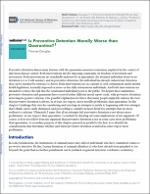Chapter 5 Is Preventive Detention Morally Worse than Quarantine?
Author(s)
Douglas, Thomas
Collection
WellcomeLanguage
EnglishAbstract
Preventive detention shares many features with the quarantine measures sometimes employed in the context of infectious disease control. Both interventions involve imposing constraints on freedom of movement and association. Both interventions are standardly undeserved: in quarantine, the detained individual deserves no detention (or so I will assume), and in preventive detention, the individual has already endured any detention that can be justified by reference to desert. Both interventions are, in contrast to civil commitment under mental health legislation, normally imposed on more-or-less fully autonomous individuals. And both interventions are intended to reduce the risk that the constrained individual poses to the public. Yet despite these similarities, preventive detention and quarantine have received rather different moral report cards, with preventive detention attracting far greater criticism. One possible explanation for this is that many people implicitly endorse the view that preventive detention is always, in at least one respect, more morally problematic than quarantine. In this chapter I challenge that view by considering and rejecting six attempts to justify it, beginning with four attempts that I think can be easily dismissed, and proceeding to consider in more detail two attempts that are more resilient to criticism. Ultimately, I argue that all six attempts fail: preventive detention is not always more problematic, in one respect, than quarantine. I conclude by drawing out some implications of my argument. Of course, it does not follow from my argument that preventive detention is not in some cases more problematic than quarantine. A secondary purpose of this chapter, pursued in parallel to the first, is to identify the considerations that determine whether and when preventive detention is indeed in some respect more problematic.
Keywords
preventive detention; quarantineISBN
9781509921430Publisher
Hart PublishingPublisher website
https://www.bloomsburyprofessional.com/hart/Publication date and place
2019Grantor
Classification
Sentencing and punishment


 Download
Download